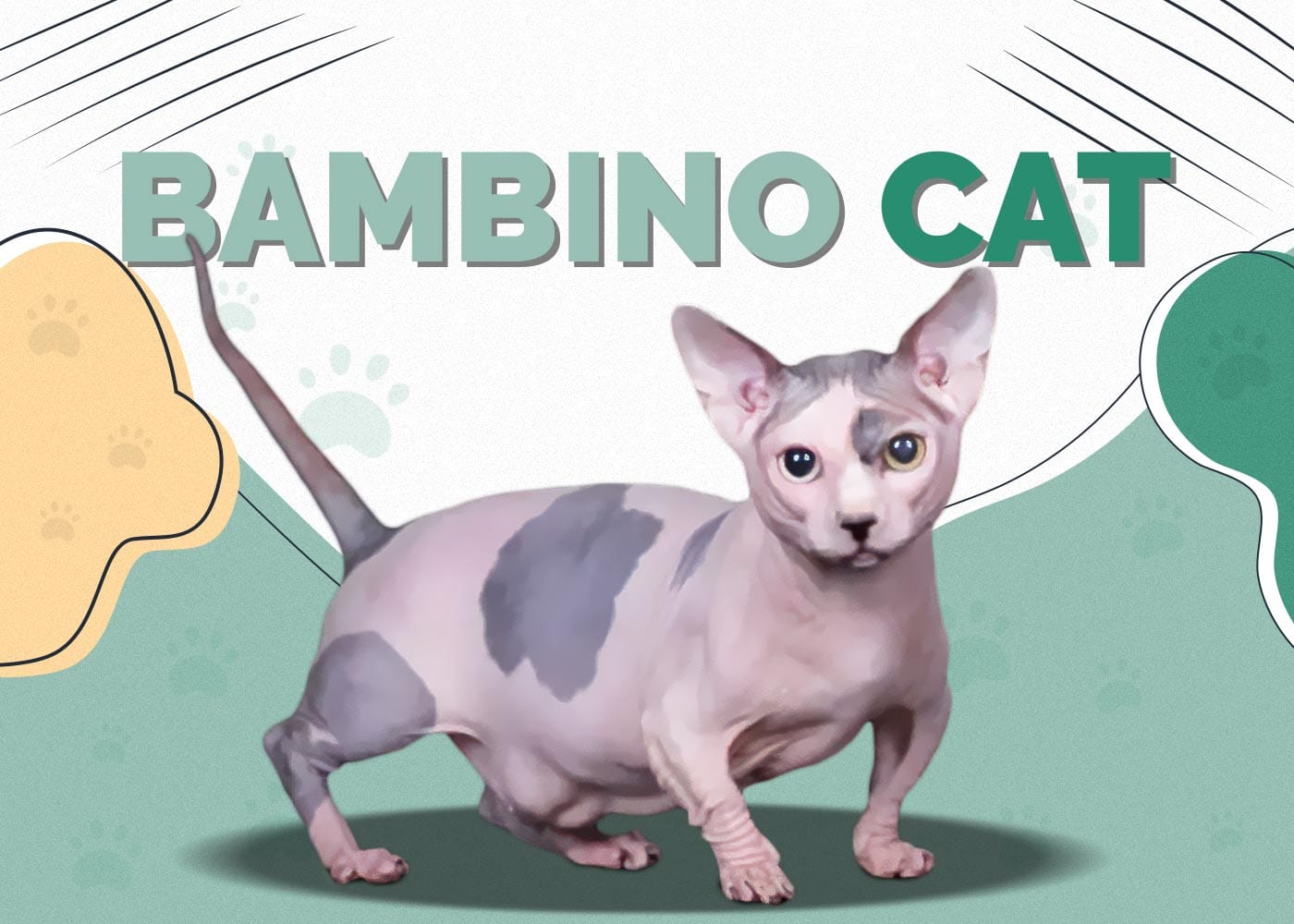Can Cats Get Parkinson’s Disease? Vet Approved Health Facts
Updated on

Click to Skip Ahead
Nothing can be more frightening than noticing that something is wrong with your cat. If your cat seems more wobbly than usual or is shaking and you’re not sure what’s wrong, it may have made you wonder if your cat has Parkinson’s disease.
Cats can’t get Parkinson’s disease, as it is something that only affects humans, nor is there an equivalent disease for felines. However, several conditions can cause tremors in cats.
In this article, we go through what can cause shaking issues in cats and how a veterinarian can treat them.
Can Cats Get Parkinson’s?
No. Parkinson’s disease is a disorder that affects part of the human brain, which slowly deteriorates and causes worsening symptoms over time. It also affects the nervous system, which impacts balance, muscle control, and movements, along with the senses and mental health. The most well-known signs of Parkinson’s are the tremors, but there is also stiffness, and speech can become slurred. Subconscious control of heart rate and blood pressure may be affected too.
So, while Parkinson’s in cats isn’t a thing, sometimes cats exhibit Parkinsonian symptoms.
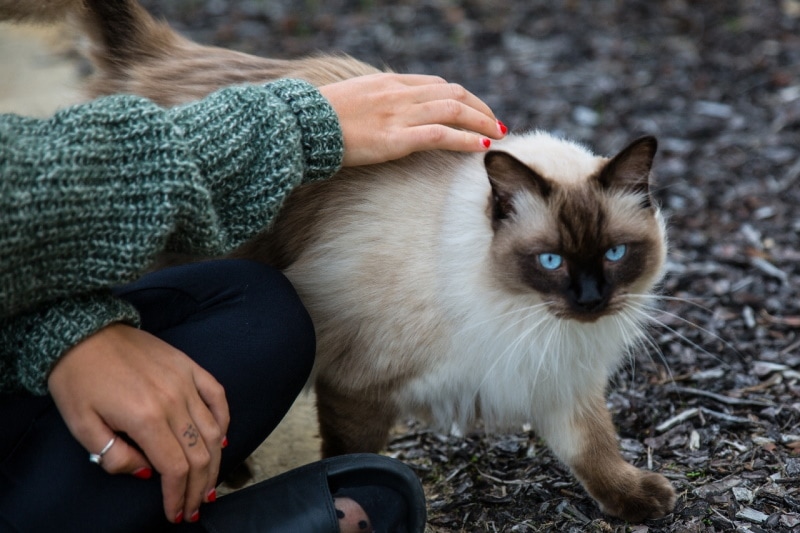
Wolff-Parkinson-White Syndrome
If you’ve been researching Parkinson’s in cats, you might have come across Wolff-Parkinson-White Syndrome (WPW). This condition has absolutely nothing to do with Parkinson’s disease, it is more commonly called ventricular pre-excitation in cats.
WPW is a rare heart disease that can affect cats, dogs and humans. It can cause a very fast heartbeat and sometimes fainting, difficulty breathing, and lethargy. It can be fatal.
Some cats must be prescribed lifelong medication, depending on the signs, while others might not need treatment immediately. This condition is typically congenital, meaning the cat was born with it although it can be acquired with other heart disease.
What Are Tremors in Cats?
When a cat starts suffering from tremors, it is typically an issue in the brain. A cat’s movement is controlled by the:
- Central nervous system: Brain and spinal cord
- Peripheral nervous system: Nerves in the body outside of the brain and spinal cord
- Musculoskeletal system: Ligaments, tendons, muscles, and bones
Some tremors are localised muscle twitches or the whole body can shake. The cerebellum is the part of the brain that controls a cat’s balance and coordination. Cats may shake due to problems with their central nervous system or muscles.

What Are the Causes of Tremors in Cats?
Several things can cause a cat to start shaking. If your cat suddenly starts having tremors, urgent veterinary care is recommended. Some causes will worsen over time so treatment in a timely manner is important.
Cerebellar Hypoplasia
Cerebellar hypoplasia is an unfortunate condition that occurs when a kitten still in the womb, and the mother is infected with the feline panleukopenia virus. This virus, also known as feline distemper, can be fatal if not treated.
Cerebellar hypoplasia means that the cerebellum is poorly developed. Kittens may tremor with different severities and have difficulty with coordinated movements such as walking. It is important to note these kittens are born this way, so if an older cat suddenly begins shaking this is not the cause.
Cerebellar hypoplasia is not contagious and doesn’t worsen as the cat ages, so many cats with this condition can learn to live with it, depending on the severity.
Low Blood Sugar
Low blood sugar, also known as hypoglycemia, can cause muscle tremors as the nervous system and muscles run out of fuel. Hypoglycemia is more commonly seen in kittens that are starving or sick, because they don’t regulate their blood glucose well. Hypoglycemia can also occur in diabetic cats administered too much insulin relative to their blood glucose. Sepsis and insulin secreting tumours are also possible causes of hypoglycemia.
Toxins
There are quite a few poisons that will affect cats and induce tremors. Common toxins include:
- Permethrins: Topical medications that contain permethrins can be found in dog flea-and-tick products.
- Methylxanthines: Such as caffeine and theobromine, commonly found in chocolate.
- Mycotoxins: Are produced by molds on food and cause tremors.
- Amphetamines: These are commonly used in ADHD medication.
- Bromethalin: This is common mouse and rat poison.
The most vital takeaway here is to use all medications only as directed on the label and ensure that all hazardous household items are out of your pet’s reach. If you suspect that your cat may have been exposed to any one of these, call your veterinarian or animal poison control for advice.
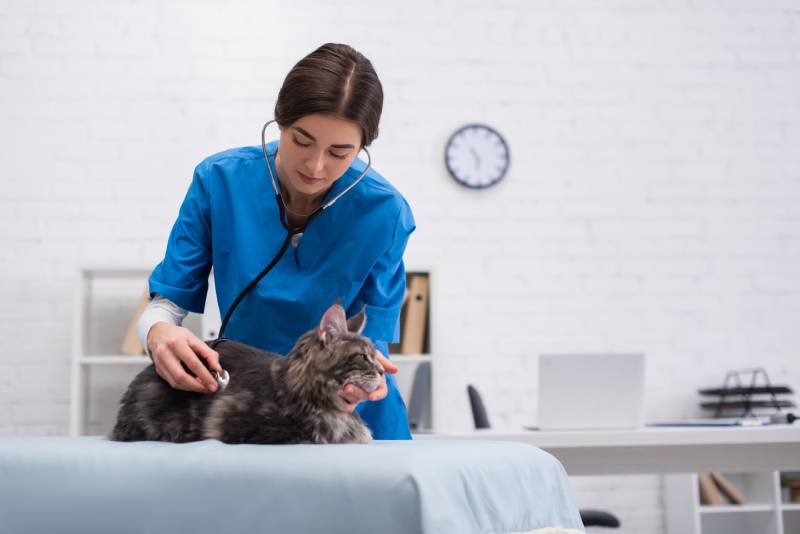
Infection
Infections like toxoplasmosis, feline infectious peritonitis, and bacteria in the central nervous system can all cause tremors in cats. These are serious infections that need to be treated by your vet right away.
Organ Disease
Kidney, liver or other underlying diseases could potentially cause tremors as they lead to secondary toxins or chemical imbalances in the body. A cat with an electrolyte imbalance might be also be experiencing a urinary tract blockage, or a long bout of vomiting and/or diarrhea.
Brain Disease
Brain tumours, head trauma and epilepsy can lead to seizures. Partial seizures can look like tremors in cats as they involve convulsive movement of only one body part. While these are technically different to tremors, the outcome can look very similar.
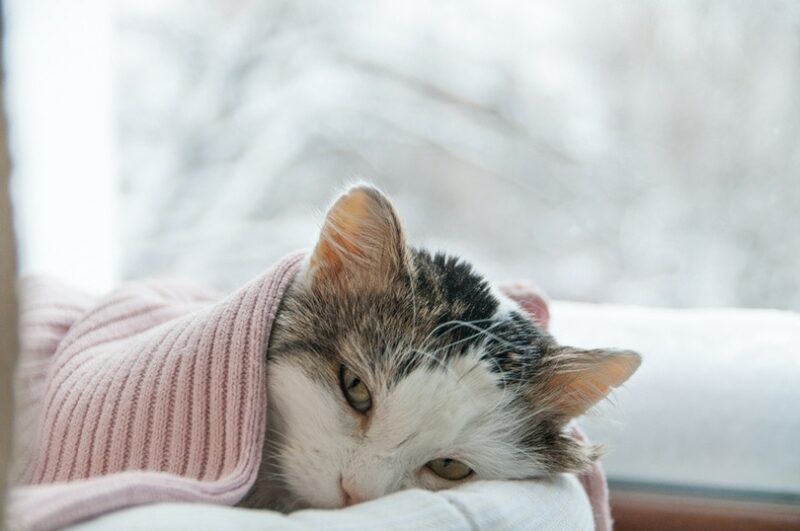
Shivers
A cat experiencing cold, fever, pain or intense emotions can definitely shiver. In this case your cat should appear coordinated and mentally alert. Cats experiencing extreme emotions, such as fear, excitement, or stress and anxiety, might tremble. This might be a one-off issue that will be resolved once the event has passed, but if your cat is anxious and trembles often, speak to your veterinarian.
Twitchy Cat Disease
Twitchy cat disease, also known as rolling skin syndrome and more formally, feline hyperesthesia syndrome, causes a great deal of twitching in a cat. There’s a fair amount of mystery surrounding this condition, as it’s not entirely known what causes it.
Affected cats will have involuntary muscle twitches, which might accompany neurological, psychological, or skin conditions. A diagnosis can take time, and treatment can include medication, behavior modification, and changes to your cat’s environment.
Other signs include:
- Twitching and rippling skin on the lower back
- Excessive jumping and running
- Tail chasing
- Dilated pupils
- Excess meowing and other vocalizations
- Lethargy
- Licking and biting the lower back end, including sides, tail, hind legs, and rear end
- Signs of pain or discomfort when touched and petted.
Nutritional
A Vitamin B1 or thiamine deficiency can cause neurological signs such as an abnormal gait. Normally these cats will be mentally dull. The underlying cause is usually related to the diet but digestive problems are also a possibility.
Parasites
Parasites like ticks and fleas will cause significant scratching, and you’ll likely notice your cat’s skin twitching and rippling more than usual.
Speak to your vet to get appropriate treatment meant for cats. You can remove the ticks yourself as long as you know the right way to do it, but having your cat checked over by your vet is still a good idea.
Some diseases and other parasites might also show up because of the infestation.
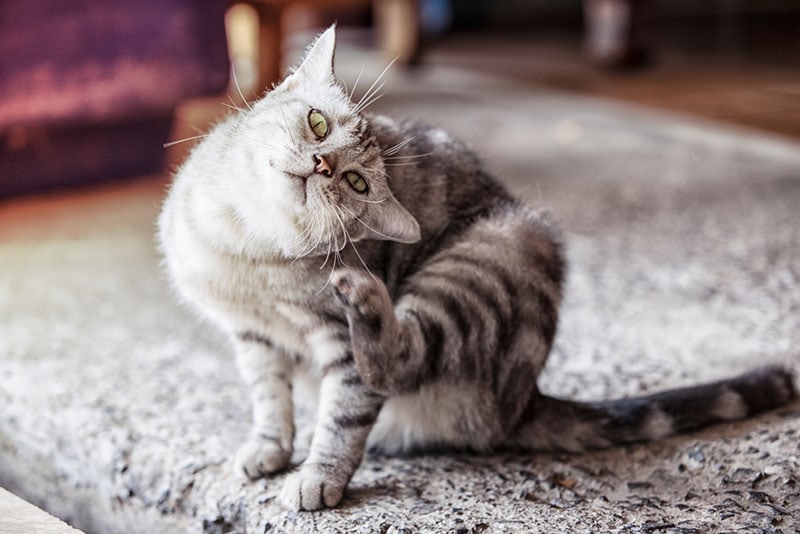
Ear Issues
Sometimes when a cat shakes their head frequently, it can give the impression that they have tremors. Ear mites and ear infections can cause head shaking. See your vet for treatment if you suspect that something is wrong with your cat’s ears.
Conclusion
While there is no such thing as Parkinson’s disease in cats, there are several potential causes for a cat shaking or twitching. As there are so many possible causes, it is best to seek veterinary treatment for your cat if their behavior is out of character.
Take notes for your veterinarian about their appetite, toileting, energy levels and when the shaking is occuring. If possible, record the episodes on your phone so your vet can see exactly what your cat is doing!
Featured Image Credit: pinkfloyd yilmaz uslu, Shutterstock






